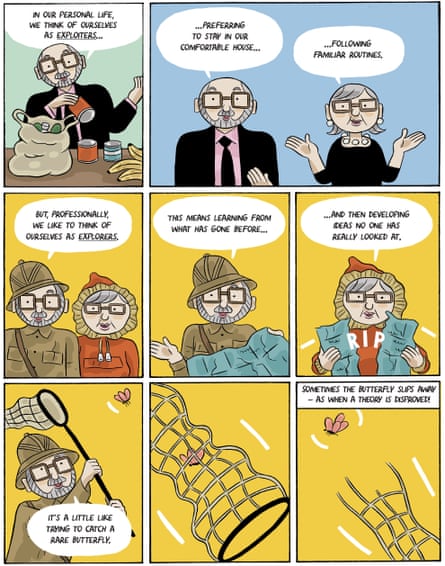This extraordinary comic is a collaboration between the neuroscientists Uta and Chris Frith, their writer son, Alex, and the artist and graphic novelist Daniel Locke. Have I ever read anything like it before? No, I’m certain that I haven’t. Each page is a visual delight: as colourful and as joyful as a book for children. It’s extremely easy to read and often very funny. And yet you finish it with your mind blown. Simply by virtue of the fact that it makes some pretty cutting-edge brain science seem almost straightforward, it subtly expands the world of the reader. Afterwards, I wasn’t only more attentive to my own thought processes (hmm, I thought, as I watched my hand reach for the bottle of sauvignon); armed with a bit more insight into the way people around me might be thinking, it’s possible that it may also have liberated me, just a little, from some all too human anxieties (what are they thinking? Doesn’t she like me? Why hasn’t he called me?).
Uta Frith, an emeritus professor of cognitive development at the Institute of Cognitive Neuroscience at University College London, and Chris Frith, emeritus professor at the Wellcome Trust Centre for Neuroimaging at University College London, are not only two of the most distinguished academics in Britain; they have also been married for 50 years. In Two Heads, their son sets out not only to tell their story – it opens with the couple, hand-in-hand, arriving at the cluttered, book-filled house in London where they’ve lived for more than three decades – but to enable them to explain to the layperson some aspects of their research (Uta is known for interest in autism and dyslexia; Chris once worked on the cognitive basis of schizophrenia). Along the way, they deliver many snappy explanations of how the brain works and some potted scientific history. The result is extremely rich, but never forced. It’s as if the brain is a fabulous gallery or museum, and they are simply taking us on an access-all-areas tour.

It’s dizzying to consider the notion that your brain may make a decision before you are aware of this decision yourself; if I was encouraged by what the Friths have to say about bias, fear, kindness and collaboration (our brains learn to believe stereotypes and adjust our behaviour to match them, which explains a lot, I think), I was reassured that even they, to a degree, find each other unknowable (minds are mysterious and perhaps that is a good thing, sometimes). The plasticity of the brain, and its ability to function even when parts of it are damaged, will never cease to be amazing.
But I must be honest: it wasn’t the science that I relished most, so much as the storytelling talents of Alex Frith and Daniel Locke. Their strips are an all-out treat, packed with visual similes and metaphors, slapstick jokes and witty, meta footnotes. With their round heads, which may be flipped open like boiled eggs to reveal the enigmatic organ within, and their ever smiling faces, the Friths, as they are drawn here, are at once themselves, clever and authoritative, and two highly original comic book characters, always larking about, always indulging in provocative little marital arguments. Like this book, they are truly delightful; you feel glad that they, and it, exist.

Comments (…)
Sign in or create your Guardian account to join the discussion